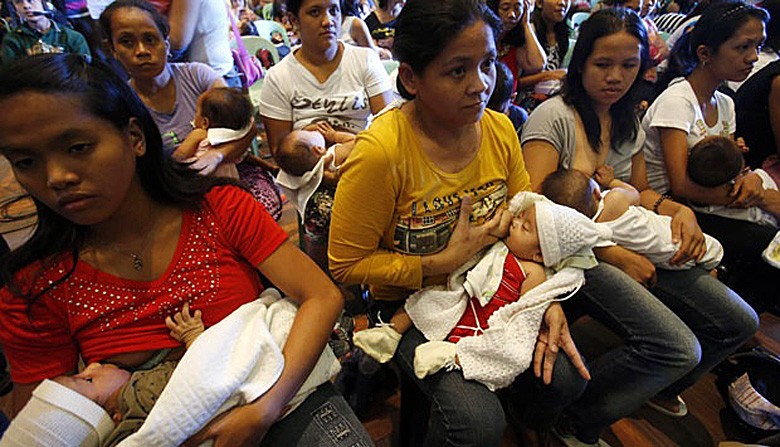UNICEF welcomes new WHO guidance on foods for children
UNICEF Indonesia has praised the World Health Organization's decision to approves a new resolution on nutrition to encourage extended breastfeeding of young children beyond six months.
Change Size
 For healthy children – Mothers breastfeed their babies at an event in Jakarta. UNICEF Indonesia has applauded the decision by the 69th World Health Assembly to strengthen the protection of breastfeeding of young children beyond 6 months of age.
(Tempo/-)
For healthy children – Mothers breastfeed their babies at an event in Jakarta. UNICEF Indonesia has applauded the decision by the 69th World Health Assembly to strengthen the protection of breastfeeding of young children beyond 6 months of age.
(Tempo/-)
U
span style="letter-spacing: 0.1px; background-color: rgb(255, 255, 255);">UNICEF Indonesia has praised the World Health Assembly's decision to approves a new resolution on nutrition to encourage extended breastfeeding of young children beyond six months.
The resolution issued by the governing body of the World Health Organization (WHO), composed of health ministers from WHO member states, last week called for an end to inappropriate promotion of foods and beverages for infants and young children, including breast milk substitutes and complimentary foods.
“This is welcome news because more than 2.5 million babies born every year in Indonesia are losing out on the full benefits of breastfeeding, as parents receiving conflicting information about what’s best for their children,” UNICEF Indonesia chief of nutrition Harriet Torlesse said in a statement on Thursday.
Indonesia prohibits the promotion and advertising of infant formula for babies aged 0-6 months.
UNICEF Indonesia says the guidance clarifies that “follow-up formula” and “growing-up milk” targeted for consumption by babies aged six months to three years should be regulated in just the same manner.
It further says breast milk is the ideal food for infants. “It is safe, clean, environmentally friendly and contains antibodies, which help protect against many common childhood illnesses,” UNICEF Indonesia said.
Breastfed children perform better in intelligence tests, are less likely to be overweight or obese and less prone to diabetes later in life. Women who breastfeed also have a reduced risk of breast and ovarian cancers.”
However, UNICEF Indonesia says, inappropriate marketing of breast-milk substitutes has continued to undermine efforts to improve breastfeeding rates and duration worldwide.
UNICEF, WHO and the Health Ministry recommend that breast milk is given to children up until at least their second birthday.
“For newborn babies, this means being breastfed immediately after delivery and fed nothing but breast milk for their first six months, no water, no other food, just breast milk. For older infants, aged between six months to at least two years, breastfeeding should continue, and be complemented by other safe and nutritionally adequate foods,” UNICEF Indonesia says. Data show that 96 percent of Indonesian women breastfeed their children at some point, and this is quite high. However, only 42 per cent of infants aged under six months are exclusively breastfed. By the time children approach their second birthday, just 55 per cent are still given breast milk.
“While we should continue our efforts to increase exclusive breastfeeding rates, we must also protect, promote and support continued breastfeeding until children are at least 2 years old,” Torlesse said.
According to UNICEF Indonesia, the breast-milk substitute business is a big one, with sales forecast to reach Rp 25.8 trillion (US$1.89 billion) in Indonesia this year. If children were breastfed according to the recommendations, the country would save Rp 20 trillion each year in healthcare costs and wages.
A study commissioned by Padjadjaran University, together with UNICEF and Alive and Thrive, reveals that improved breastfeeding in Indonesia could save 5,377 child lives and Rp 3 trillion in health costs every year by preventing childhood illnesses such as pneumonia and diarrhoea. Boosting breastfeeding could save Rp 17 trillion in wages each year on improvements in cognitive ability and increased earnings in later life.
“UNICEF urges the government to extend the scope of the current national legislation to include the promotion and advertising of all breast milk substitutes that are specifically marketed for feeding infants and young children up to the age of three years.” (ebf)









